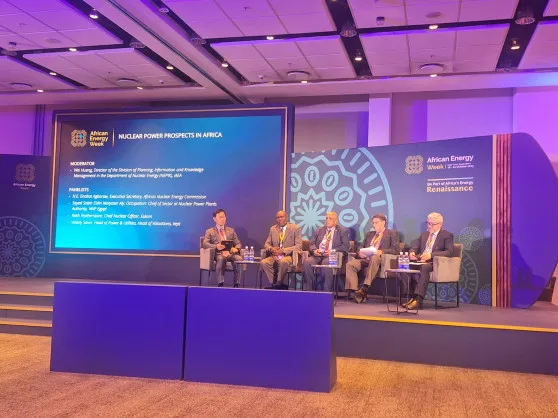
The significant advantages of nuclear energy in addressing Africa’s energy needs and eradicating energy poverty was highlighted during a panel discussion at African Energy Week, in Cape Town.
Enobot Agboraw, Executive Secretary of the African Commission on Nuclear Energy noted factors including longevity, cost-effectiveness and the environmental resilience of nuclear power as reasons why more African states needed to consider investing in this energy source, underscoring its importance in ensuring a stable energy supply for the rapidly growing African population.
“Africa realizes that the issue of energy poverty is an emergency. With our population expected to double to 3 billion by 2050, we need to introduce energy solutions fast. Nuclear power, with its long lifespan and reliability, stands out as a key pillar in Africa’s energy transition efforts,” he said.
He added that although most countries in Africa would not be able to finance such projects on their own, he believed that through combined efforts, such as multilateral approaches, countries looking to invest in nuclear energy would be pooling their resources, reducing financial and proliferation risks.
Meanwhile, Sayed Salah Eldin Motyaser Aly, NNP Egypt chief of sector, shared updates on Egypt’s nuclear initiatives, as the northern African country is currently constructing its first nuclear energy plant in El Dabaa. “This nuclear project represents the start of our future industrialization. It has created the opportunity for highly skilled jobs and the development of local industries and Egypt has invested in many initiatives such as the dedicated El Dabaa vocational school, as well as a training program implemented with our strategic partner to ensure we have the skills needed to take this project forward.”
Also speaking during the panel discussion, Keith Featherstone, Chief Nuclear Officer at Eskom, highlighted South Africa’s potential for extending the lifespan of existing nuclear plants, adding that it was currently the only country on the continent which had nuclear energy generation capacity. He highlighted the opportunities presented by small modular reactors (SMRs), which had been placed on hold, and the potential use of nuclear energy to repurpose fossil fuel sites, contributing to cleaner energy production. “I personally am hopeful that the future requests for proposals will allocate more capacity to nuclear as it definitely is one of the most reliable baseload energy options we’ve got, especially in the South African energy sector.”
Emphasizing the need for sustainable energy solutions, Vassily Savin, Head of Power and Utilities at KEPT, noted although African states could rely on its natural resources of sun, wind and water to provide alternative power sources, a recent analysis focused on South Africa and East Africa showed that it would not be enough to allow for industrialization. “Our modeling shows that achieving this only on renewables is not achievable at all. Africa needs a sustainable grid and sustainable sources of energy. Nuclear energy is a reliable, low-carbon source that could replace retiring fossil fuel plants and allow for the integration of renewables.
“The main bottleneck here is financing. Fossil fuels are not favored by multilateral banks, and surprisingly, neither is nuclear. But if multilateral banks would finance nuclear, it would dramatically help eliminate energy poverty in Africa,” he concluded.
#AEW2023 – organized by the African Energy Chamber takes place this week in Cape Town under a mandate to make energy poverty history by 2030. Keep following www.AECWeek.com for information and updates about Africa’s premier energy event.
Distributed by APO Group on behalf of African Energy Chamber.
